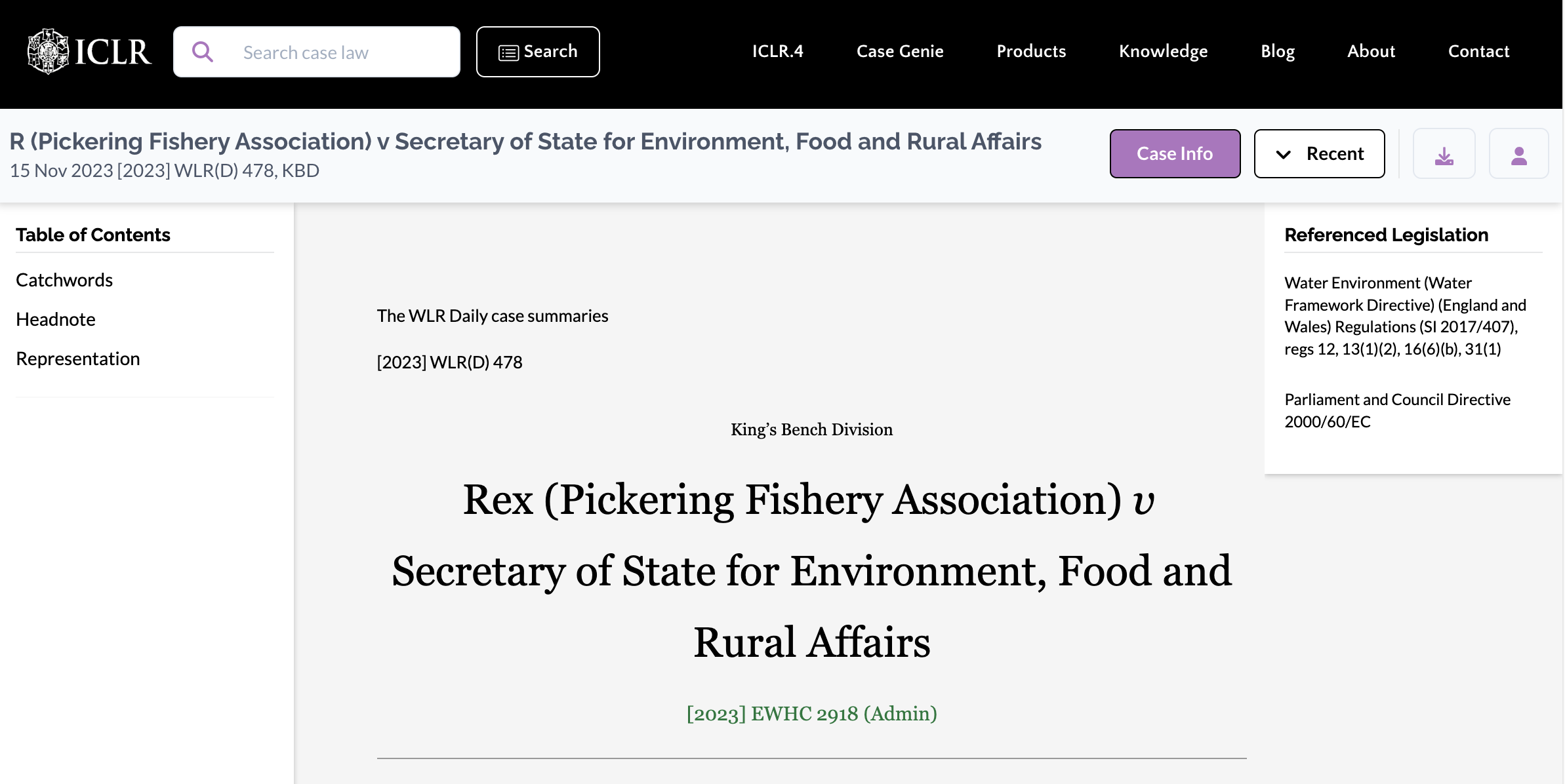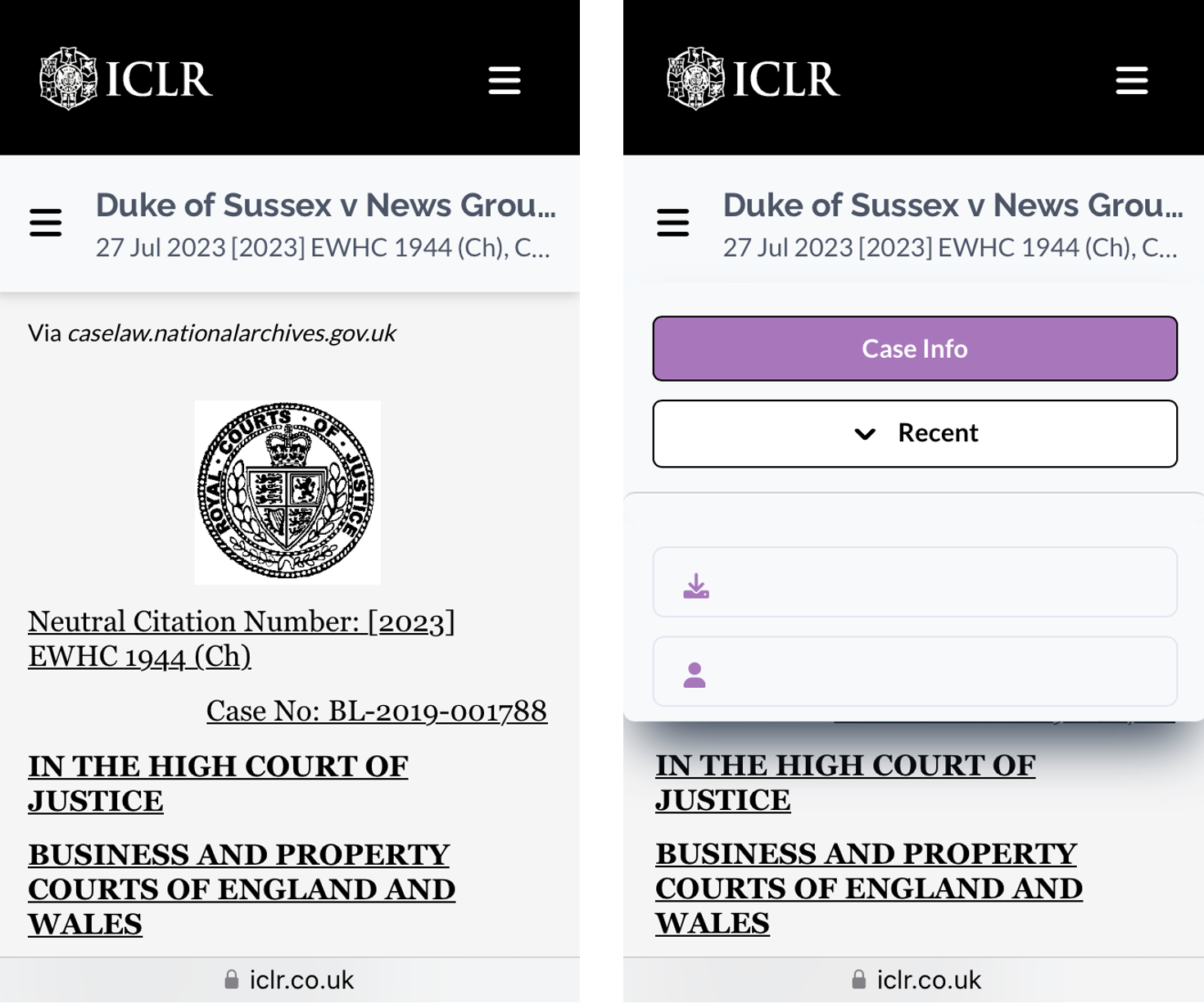Weekly Notes: legal news from ICLR, 18 December 2023
Our last roundup before the Christmas break celebrates ICLR’s own recent platform developments. Plus recent case law and commentary available on the site.… Continue reading

Seasons greetings
We wish all our subscribers and other readers a very Merry Christmas and a Happy New Year for 2024. Michaelmas Term ends on 21 December. Next year’s term dates are as follows:
Hilary: Thursday 11 January to Wednesday 27 March 2024
Easter: Tuesday 9 April to Friday 24 May 2024
Trinity: Tuesday 4 June to Wednesday 31 July 2024
Michaelmas: Tuesday 1 October to Friday 20 December 2024
This is the last Weekly Notes for this term, but we will continue to post other material on the blog over the holiday break.
Vacation sittings
For information about court sittings over the vacation, see Judiciary: High Court of Justice: Christmas Vacation 2023-24
ICLR News
Website update
ICLR.4 was launched two years ago with a number of major enhancements over the previous version. Chief among the new features was Case Genie, our AI-powered case search tool, which recommends relevant or similar cases based on the user’s uploaded text or document. We also expanded and enhanced the display of case index information via the Case Info page, and improved the display of legislation, including a new “timeline” feature.
Over the last year, we have also added many more links to cited cases and legislation, and vastly increased the number of unreported judgment transcripts available alongside all our reported case law going back to 1865. This includes all judgments in English from the European Court of Justice, all the judgments of senior courts of England & Wales currently available from The National Archives, plus a growing number of tribunal cases, including all the judgments of the Competition Appeal Tribunal.
Display enhancements
While in the past our research suggested that most subscribers or free users tended to access the site via desktop or laptop devices, we’ve becoming increasingly conscious that — especially with the growth of online hearings — people are now using a variety of devices of different screen dimension to access different types of content. To that end, we are developing the user interface to make it more flexible and adaptive to smaller screens. This will involve some changes in the layout of elements on the page.
The first thing you will notice is that the site now displays much better on a small screen, such as that of a smartphone or tablet. Visual elements in the page which were previously liable to overlap have been isolated so that they can be rearranged in a single column on a small screen. Some elements will now appear in a compressed or collapsed form, capable of expansion if required, but otherwise avoiding taking up too much screen space.
Some buttons, commands or drop-down elements have been moved to make it easier to operate them on a smaller screen. So, for example, when viewing a case report or transcript on a large screen, the buttons for “Case Info” (showing index information about the case) and “Recent” (a dropdown showing previously viewed cases) have been moved to the right of the case name, next to the PDF download button. This gives greater space for longer case names:

On smaller screens, these elements are stacked vertically. Menus have been collapsed into a “hamburger” dropdown button, appearing as three horizontal lines. These list all the relevant functions from a single button. Here, for example, is the display of a recent judgment transcript, as it appears on a smartphone screen, and the options available from the dropdown menu:

Fresh look and feel
The Blog and Knowledge pages have also been given a fresh appearance, with new typefaces, menus and brighter colours, and the information about our Products has been rearranged to make it easier to find in one place.
Further small changes will continue to be made as we improve the site’s accessibility and readability for all devices.
Legal research
AI: proceed with caution, say judges
Artificial Intelligence has been the big story over the past year — particularly the spectacular rise of generative AI, which can respond to prompts and queries in an linguistically coherent, but not always factually accurate, way. We at ICLR use a more traditional form of AI in our case law research tools, notably Case Genie, developed using a combination of natural language processing (NLP) and machine learning (ML). But these are relatively old hat in the brave new world of generative AI, which we are also looking at for some current research and development, about which more will be revealed in due course.
Generative AI in the form of large language models (LLMs) such as Chat GPT, Bard, Claude and others, has certainly attracted a good deal of attention this year. There have been stories about litigants, even lawyers, relying on cases cited by such models, which have turned out to be plausible sounding fakes. In a widely reported story from New York, two lawyers were sanctioned by a judge for failing to check what turned out to be fake citations derived from research using Chat GPT. That happened in June, yet as recently as this month another litigant was fooled into doing the same thing in a tax tribunal in England. In Harber v Revenue & Customs Commissioners [2023] UKFTT 1007 (TC), FTT, according to Legal Futures,
“Nine authorities put before the First-tier Tribunal (FTT) by a litigant in person challenging a penalty from HM Revenue & Customs (HMRC) were fakes generated by an artificial intelligence (AI) system like ChatGPT, a judge has ruled.”
It turned out she had been given the faulty research material by a friend in a solicitors’ office. This probably helps explain why the judiciary has now issued guidance on AI, saying “All judicial office holders must be alive to the potential risks”.
Artificial Intelligence (AI) — Guidance for Judicial Office Holders (12 December 2023) sets out some basic definitions and explanations of AI. It points out that “Public AI chatbots do not provide answers from authoritative databases”, and that’s because most of these LLMs have been developed using freely available content on the internet, rather than the carefully edited content prepared by legal editors and generally kept behind a paywall. In addition, “Their ‘view’ of the law is often based heavily on US law although some do purport to be able to distinguish between that and English law”.
Other risks include the fact that information and data entered into an LLM via the prompt or queries put to the model may not be kept confidential. Indeed, it may well end up being published by the model elsewhere in response to later prompts.
But while care should be taken, there is no doubt that these models have their uses. Speaking at a recent Westminster Legal Policy Forum on The Future for AI in Legal Services, Kerry Westland, head of innovation and legal technology at national firm Addleshaw Goddard, said the arrival of generative AI had turned the process of legal tech purchasing and adoption “on its head”. As reported in Legal Futures, she said:
“We could spend a long time navel-gazing, but I do not think we have the time to do that. The longer you wait, the more you miss out in terms of the learning and cultural change.”
See also: Joshua Rozenberg, The perils of courtroom AI
Recent case summaries from ICLR
A selection of recently published WLR Daily case summaries from ICLR.4:
COMPANY — Unfair prejudice — Petition: Ntzegkoutanis v Kimionis, 12 Dec 2023 [2023] EWCA Civ 1480; [2023] WLR(D) 517, CA
COSTS — Order for costs — Appeal: Comr of Police of the Metropolis v Malik, 14 Dec 2023 [2023] EWHC 3213 (Admin); [2023] WLR(D) 523, KBD
CRIME — Homicide — Loss of self-control: R v Drake, 04 Dec 2023 [2023] EWCA Crim 1454; [2023] WLR(D) 514, CA
DATA PROTECTION — Personal data — Access to: R (the3million Ltd) v Secretary of State for the Home Department, 11 Dec 2023 [2023] EWCA Civ 1474; [2023] WLR(D) 518, CA
DENTIST — Discipline — Registration: Aga v General Dental Council, 13 Dec 2023 [2023] EWHC 3208 (Admin); [2023] WLR(D) 521, KBD
EASEMENT — Right to park — Grant: Duchess of Bedford House RTM Company Ltd v Campden Hill Gate Ltd, 08 Dec 2023 [2023] EWCA Civ 1470; [2023] WLR(D) 516, CA
INJUNCTION — Freezing order — Application: Magomedov v TPG Group Holdings (SBS) LP, 06 Dec 2023 [2023] EWHC 3134 (Comm); [2023] WLR(D) 522, KBD
MENTAL HEALTH — Patient — Examination: Derbyshire Health Care NHS Trust v Secretary of State for Health and Social Care, 14 Dec 2023 [2023] EWHC 3182 (Admin); [2023] WLR(D) 524, KBD
PLANNING — Development — Permitted development: R (Clarke-Holland) v Secretary of State for the Home Department, 06 Dec 2023 [2023] EWHC 3140 (Admin); [2023] WLR(D) 520, KBD
PRACTICE — Case management — Unless order: Al Saud v Gibbs, 05 Dec 2023 [2023] EWHC 3111 (Comm); [2023] WLR(D) 515, KBD
PRACTICE — Disclosure — Action for: The Kingdom Bank Corpn v Moorwand Ltd, 01 Dec 2023 [2023] EWHC 3069 (Comm); [2023] WLR(D) 519, KBD
Recent case comments on ICLR
Expert commentary from firms, chambers and legal bloggers recently indexed on ICLR.4 includes:
Mills & Reeve: Multi-million-pound defective design claim out of time: Lendlease Construction (Europe) Ltd v Aecom Ltd [2023] EWHC 2620 (TCC), KBD
Law & Religion UK: An “offensive” art exhibition and Article 9: Asociación de Abogados Cristianos v Spain (Application no 22604/18), ECtHR
Inforrm’s Blog: News: Duke of Sussex wins phone hacking claims against Mirror Group, “cover up” exposed, substantial damages awarded: The Duke of Sussex & Ors v MGN Ltd [2023] EWHC 3217 (Ch), Ch D
Nearly Legal: Varying a possession order from discretionary to mandatory ground: Poplar HARCA v Kerr, 23 Jul 2023 Transcript PDF, County Ct
Global Freedom of Expression: BILD GMBH v. Germany: mixed outcome: Bild GmbH & Co KG v Germany (Application no. 9602/18); [2023] ECHR 851, ECtHR
Law & Religion UK: Church autonomy and dismissal from employment: Ţîmpău v Romania (Application no. 70267/17); [2023] ECHR 982, ECtHR
UK Human Rights Blog: Defra’s generic plan for river clean up unlawful — local focus on water bodies needed: R (Pickering Fishery Association) v Secretary of State for Environment, Food and Rural Affairs [2023] EWHC 2918 (Admin); [2023] WLR(D) 478, KBD
Local Government Lawyer: Tier 4 CAMHS, detainability under the Mental Health Act 1983 and (righteous) judicial frustration: Lancashire County Council v X [2023] EWHC 2667 (Fam), Fam D
Out-Law: Ruling indicates Upper Tribunal’s “narrow approach” towards windfarm capital allowances: Gunfleet Sands Limited & Ors v Revenue And Customs [2023] UKUT 260 (TCC), UT
UK Supreme Court Blog: Case preview: George v Cannell (appn all) [2023] 1 WLR 784, SC(E)
And finally…
Tweet of the week
is from Kirsty Brimelow KC, with a memorable moment in her glittering career:
So- this morning I was waiting to be admitted into the Court of Appeal on a remote link. I was fully robed;all in black. A big case but I’m looking smart. “I’ll just open this Xmas card whilst I’m waiting “ I thought.
Thanks friend for filling it with glitter.Ta daaa My Lord!
— Kirsty Brimelow KC (@Kirsty_Brimelow) December 15, 2023
That’s it for now. Thanks for all your tweets and toots and threads. Enjoy the holiday break and see you all in the new year.
This post was written by Paul Magrath, Head of Product Development and Online Content. It does not necessarily represent the opinions of ICLR as an organisation.